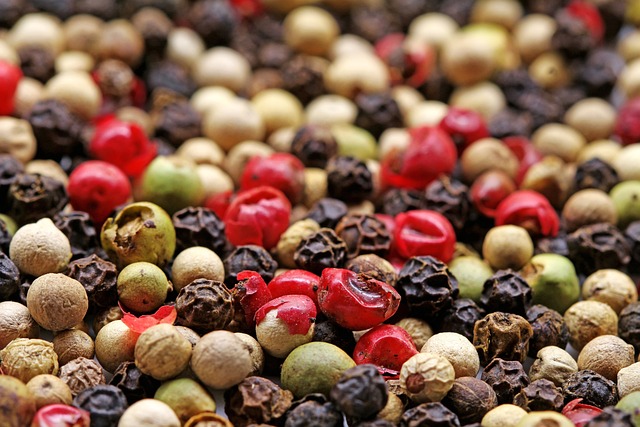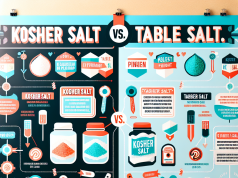Contents
Black Pepper and Digestion: Exploring the Connection
Black pepper, also known as the “king of spices,” is a commonly used spice that adds a unique flavor to various dishes. However, its benefits extend far beyond just enhancing the taste of our meals. Black pepper has been linked to numerous positive effects on digestion.
One of the key components of black pepper is a compound called piperine. This compound has been shown to stimulate the production of digestive enzymes in the pancreas, thereby improving the overall digestion process. By promoting the breakdown of food in the stomach and intestines, black pepper can help prevent digestive issues such as bloating, gas, and indigestion.
Furthermore, black pepper has been found to increase the bioavailability of certain nutrients. This means that it can enhance the absorption and utilization of essential vitamins and minerals from the foods we consume. Adequate absorption of nutrients is crucial for maintaining a healthy digestive system.
Some studies have also suggested that black pepper may have antimicrobial properties, which can help protect against harmful bacteria in the gut. Furthermore, it may promote a healthier balance of gut bacteria, supporting overall gut health and digestion.
While black pepper can offer several benefits for digestion, it is important to note that excessive consumption may lead to negative effects. It is recommended to use black pepper in moderation and consult with a healthcare professional if you have specific digestive concerns or conditions.
In conclusion, black pepper has a notable connection to digestion. Its compounds, such as piperine, can enhance the production of digestive enzymes, improve nutrient absorption, and support a healthier gut environment. Incorporating black pepper into your diet in appropriate amounts can be a simple yet effective way to promote better digestion.
Black Pepper and Digestion: Exploring the Connection
Keywords: black pepper, digestion, health, spice, gastrointestinal tract, enzymes, absorption, nutrients
Understanding Digestion and Its Importance
Digestion is a crucial process that breaks down the food we eat into smaller molecules, making it easier for our bodies to absorb nutrients. It involves the mechanical and chemical breakdown of food, primarily taking place in the gastrointestinal tract.
The Role of Black Pepper in Digestion
Black pepper is considered one of the most widely used spices around the world. Apart from enhancing the taste of various dishes, black pepper has been associated with several potential health benefits, including improved digestion.
Research suggests that black pepper stimulates the release of digestive enzymes in the pancreas, aiding in the proper breakdown of carbohydrates, proteins, and fats. These enzymes help optimize the digestion process by breaking down complex molecules into simpler ones.
Additionally, black pepper has been found to increase bile production. Bile plays a crucial role in the digestion and absorption of fats. By stimulating the production of bile, black pepper ensures efficient fat digestion and absorption.
Enhancing Nutrient Absorption
Proper digestion is closely linked to nutrient absorption. When food is effectively broken down into smaller molecules during digestion, nutrients are more readily absorbed by the body. Black pepper has been shown to enhance the bioavailability of nutrients, ensuring optimal absorption.
One particular compound found in black pepper, called piperine, has been identified as a potent bioenhancer. Piperine may increase the absorption of several nutrients, such as vitamins (Vitamin A, C, and E), minerals (selenium, zinc, and calcium), and phytochemicals (curcumin and resveratrol).
Preventing Digestive Disorders
Poor digestion can lead to various gastrointestinal issues, such as bloating, gas, and indigestion. Adding black pepper to your meals may help prevent these digestive disorders.
Black pepper possesses anti-inflammatory and carminative properties, which can reduce inflammation and relieve gas and bloating. Its antimicrobial properties may also help inhibit the growth of harmful bacteria in the digestive tract, promoting a healthy gut environment.
Conclusion
Black pepper is not just a delicious spice; it also offers numerous benefits for digestion. By stimulating digestive enzymes, increasing bile production, enhancing nutrient absorption, and preventing digestive disorders, black pepper plays a vital role in maintaining a healthy digestive system.
Learn more about the fascinating connection between black pepper and digestion in our related blog post.
Frequently Asked Questions
Q: Can black pepper help with digestion?
A: Yes, black pepper is known to aid digestion.
Q: How does black pepper improve digestion?
A: Black pepper stimulates the taste buds, enhances the secretion of digestive enzymes, and increases the absorption of nutrients.
Q: What are the specific benefits of black pepper for digestion?
A: Black pepper can help relieve bloating, gas, and indigestion. It also promotes gut health and regular bowel movements.
Q: Can black pepper be harmful to digestion?
A: In general, black pepper is safe and well-tolerated. However, consuming excessive amounts of black pepper may cause irritation in some individuals.
Q: How should I incorporate black pepper into my diet for better digestion?
A: You can simply sprinkle ground black pepper on your meals or add it to marinades, dressings, or sauces. It is also commonly used in combination with other spices for seasoning.
How Black Pepper Affects Digestion
Black pepper is a commonly used spice that can have various effects on digestion. Its active compound, piperine, has been studied for its potential benefits in improving digestive health.
Enhancing Digestive Enzymes
The consumption of black pepper has been shown to stimulate the secretion of digestive enzymes in the pancreas, such as amylase, lipase, and protease. These enzymes are crucial for breaking down carbohydrates, fats, and proteins, respectively, aiding in their digestion and absorption.
Increasing Nutrient Absorption
Black pepper has also been found to enhance the bioavailability of certain nutrients. Piperine can inhibit enzymes in the liver that metabolize various compounds. This inhibition can lead to increased absorption of nutrients like vitamins A and C, selenium, beta-carotene, and more.
Promoting Gut Health
Studies have suggested that piperine in black pepper may have anti-inflammatory and antioxidant properties, which can contribute to a healthier gut. Inflammation in the digestive tract is often linked to various gastrointestinal disorders, and black pepper may help reduce this inflammation and promote overall gut health.
For more detailed information on black pepper and its effects on digestion, you can visit the Wikipedia page on black pepper.
Black Pepper and Digestion: Exploring the Connection
-
Benefits of Black Pepper for Digestion
- Improved Nutrient Absorption
- Reduced Gas and Bloating
- Enhanced Bowel Movements
-
How Does Black Pepper Aid Digestion?
- Stimulates Salivary Glands
- Increases Stomach Acid Secretion
- Activates Digestive Enzymes
- Improves Intestinal Motility
-
Ways to Incorporate Black Pepper for Digestion
- Sprinkle on Meals and Recipes
- Use in Homemade Digestive Teas
- Add to Smoothies or Juices
- Include in Ayurvedic Remedies
-
Precautions and Considerations
- Monitor Personal Tolerance
- Avoid Excessive Consumption
- Consult a Healthcare Professional
- Be Aware of Potential Allergies








































